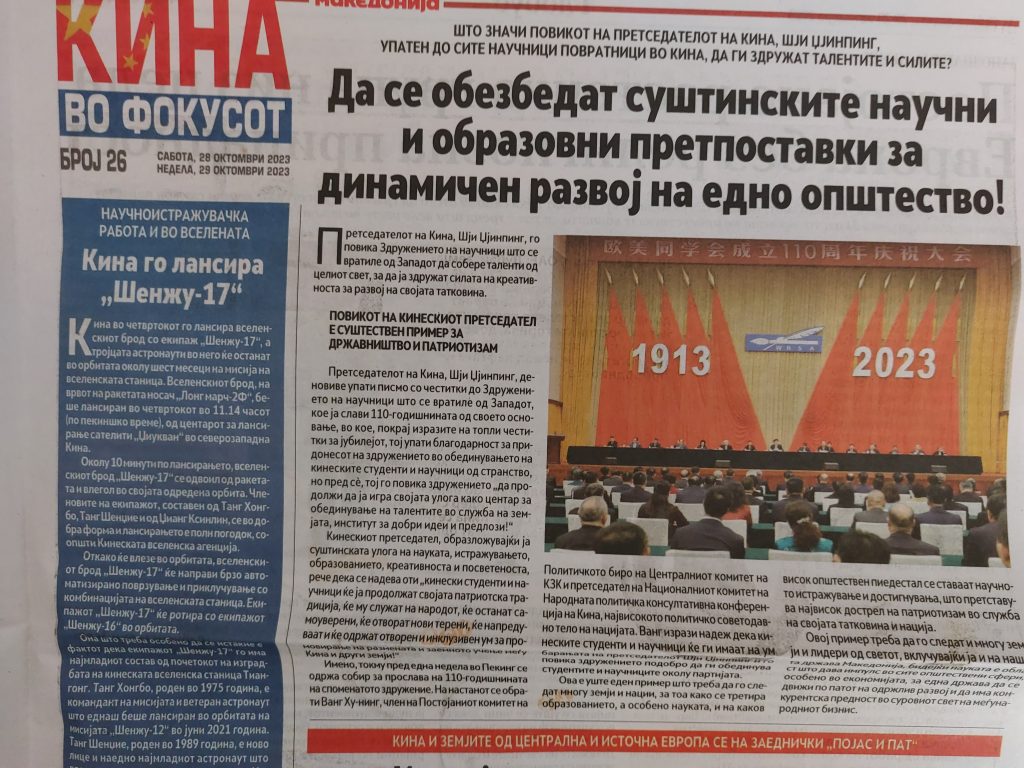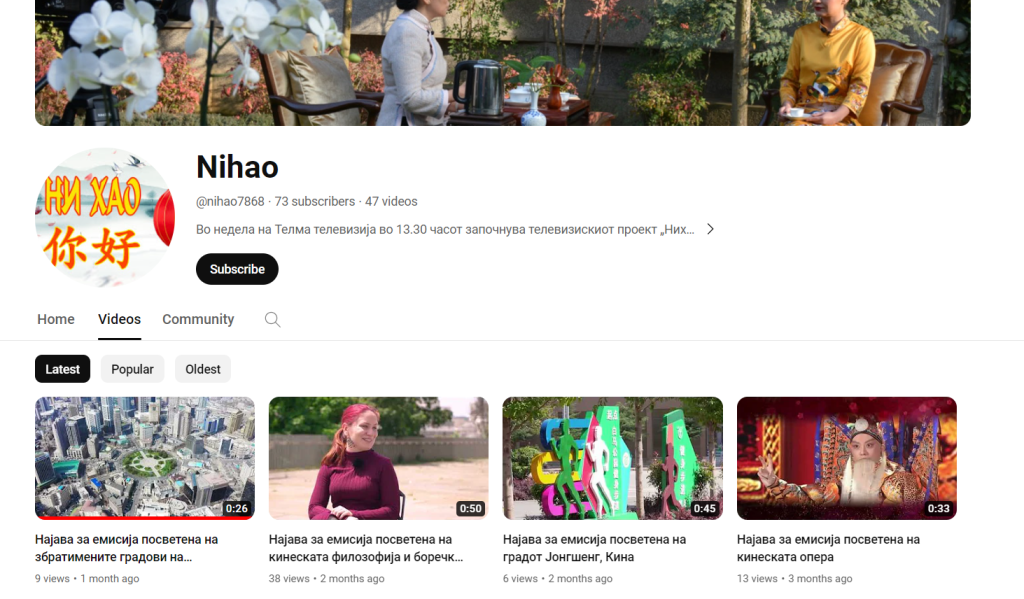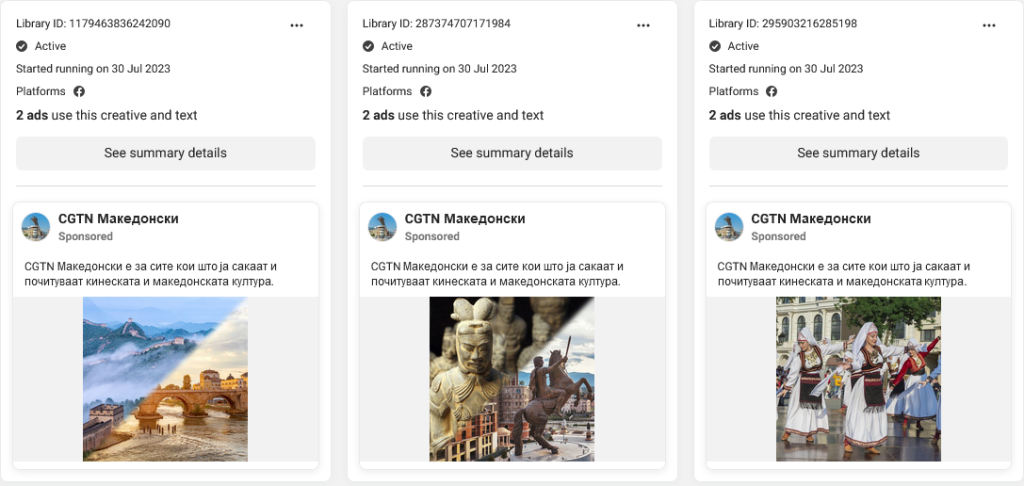Collage of photographs by Meta.mk
In the media sector in North Macedonia, China applies various strategies to influence the narratives, such as the presence of Chinese state-owned media, cooperation with local media, and coopting local journalists. While media freedom is not at risk, concerns have been raised about the rise of Chinese propaganda shaping public perceptions in the region”, states the publication ”China’s Influence on the Western Balkan’s EU Accession Process: Synergies and Obstacles”
Author: Bojan Blazhevski
TV shows, newspaper sections dedicated to China, columns and interviews of the Chinese Ambassador to North Macedonia, as well as promoting and publishing media content from leading Chinese media that are under the direct control of the Chinese Communist Party. Unlike the decreased Chinese influence of the pro-European political leadership of the country, the data shows that the influence of China in the Macedonian media sector has grown in recent times. The messages of the Chinese Embassy in Skopje reach Macedonian media easily.
In the media sector in North Macedonia, China applies various strategies to influence the narratives, such as the presence of Chinese state-owned media, cooperation with local media outlets and coopting local journalists. While media freedom is not at risk, concerns have been raised about the rise of Chinese propaganda shaping public perceptions in the region, states the publication ”China’s Influence on the Western Balkan’s EU Accession Process: Synergies and Obstacles”, implemented as a joint project of the Foundation Konrad Adenauer and the Centre for European Studies Wilfried Martens.
The authors of the publication: Ana Krstinovska, Bledar Feta, Aleksandra Stanković, Senada Šelo Šabić, Aleksandra Davitkovska-Spasovska, and Momčilo Radulović specify that Chinese presence in the Western Balkans is a challenge for the region’s efforts to comply with EU values and standards in this area. The publication stresses that the media is one of the critical sectors, together with the IT and telecommunications sector, in which Chinese entities operate.
In North Macedonia, most of the promotional content is put forward through the Chinese Embassy and its links with local media outlets, including the Media Information Agency (MIA) and National Broadcasting Service (MRT). In addition, columns are regularly published in prominent media such as “Nova Makedonija”, as well as on marginal internet portals, putting forward China’s positions. Television “Telma” with national coverage is also broadcasting a TV show sponsored by the Chinese Embassy and aimed at promoting Chinese traditional and modern culture, the analysis exemplifies.
The authors of the publication also stress that the bilateral cooperation agreements in the countries in the region provide an opportunity for local journalists, editors, and media professionals to visit China, participate in various training programs and travel to regions such as Xinjiang or Tibet.
The trips aim to show them the side of China that the Chinese government wants them to see, to encourage them to write and ”debunk” the Western arguments on these sensitive issues, specifies the publication ”China’s Influence on Western Balkan’s EU Accession Process: Synergies and Obstacles”.
The authors of this publication stress that the Chinese presence in Western Balkan countries has a negative impact on the media.
This analysis published this autumn follows a similar research that was published in December 2022 and which presents data about the Chinese influence in the Macedonian media sector. Its author Ana Krstinovska in the study titled “Understanding the tools, narratives and impact of Chinese “soft power” in North Macedonia” in the part referring to the media derived almost identical conclusions as this year’s publication.
Last year’s analysis explains that North Macedonia has not seen particular benefits from the economic cooperation with China. Yet, recent research into China’s presence and portrayal in the media has indicated that China’s influence in North Macedonia is quite strong, ranking 3rd among 17 countries in Central and Eastern Europe (CEE), behind Serbia and Bulgaria.
The analysis pinpoints that modern China is presented through the television show Ni Hao, broadcast bi-weekly on Telma, a television station with national coverage. The show, which is sponsored by the Chinese Embassy, sets the objective to “present China the way it is”, “show China’s real meaning” and “what it gave to the world in every context” – architecture, philosophy, technology, fashion, medicine, etc.
The author Ana Krstinovska writes that columns and articles by the Chinese Ambassador were found in selected print and online media and internet portals last year such, as the Macedonian Information Agency, newspapers ”Nova Makedonija”, “Večer” and ”Premin” as well as the online media Antropol and Opserver.
What do the Macedonian media outlets with noted Chinese presence say?
Meta.mk tried to get answers from all Macedonian media listed in the publication “China’s Influence on the Western Balkan’s EU Accession Process: Synergies and Obstacles” as entities publishing promotional content on China proposed by the Chinese Embassy in Skopje.
We sent requests for access to public information to the state news agency Media Information Agency and the Public broadcaster Macedonian Radio-Television. The answers we received were that there is no Chinese influence on them.
The Macedonian Radio-Television in its response to our request for comments on the claims made in the publication “China’s Influence on the Western Balkan’s EU Accession Process: Synergies and Obstacles” responded that they were not true.
”MRT has not established any kind of cooperation with the Chinese Embassy in Skopje regarding publishing promotional content on the Chinese positions,” says MRT’s reply to Meta.mk.
MRT adds that the last Memorandum of Understanding with the Chinese National Television was signed in 2003 and that there is no cooperation with exchanging program content that would be broadcasted by MRT’s services.
The state-owned news agency MIA replied that it did not publish propaganda-related articles, which also applies to the Chinese Embassy in Skopje. Advertisement business articles were published in a separate category and section, but they did not publish paid political content.
The agency explained that it cooperates with more than 50 agencies worldwide. In 2005, a news exchange memorandum was signed with the Chinese news agency Xinhua, but despite that, the agreement has not been not operational in the last 10 years.
The desk journalists usually use mainly AFP, DPA, Reuters, BBC, ENR and the Balkan network ABNA, the Media Information Agency responded.
The agency adds that the Chinese Embassy had reacted to and disagreed with some of the articles published by MIA in the last few years. They did not find the content adequate, but that did not affect the editorial policy of the news agency.
MIA explains that there is no special or commercial cooperation with the Chinese Embassy in Skopje. Also, no document or a Memorandum of Understanding was signed.
Nevertheless, MIA adds that it has been cooperating with international institutions and embassies in the country, including the Chinese Embassy in Skopje, on special occasions – the state protocol events of all embassies and international representatives.
From time to time, MIA publishes the positions of the ambassadors, embassies and international institutions with clear indications and disclaimers that the given position is of the author only. MIA’s editorial policy distinguishes between the newsroom’s opinion and the publication of announcements, positions of various embassies, a selection from global press and the marketing and promotional content framed as original articles with a disclaimer that the text is not hidden marketing or opinion or the editorial policy of the medium and are categorized as original articles, is the response we got from MIA.
We also sent requests for answers to the newspapers “Nova Makedonija” and “Vecher”, and Telma TV via e-mail on three occasions – 7, 16, and 27 November 2023. We did not receive answers from the three private media outlets about the claims in the publication, nor did they explain what kind of cooperation they had with the Chinese Embassy in Skopje or with other Chinese institutions regarding the publication of promotional material on China and how it affects the editorial policies of the media.
What does the analysis of published media content about China show?
Meta.mk searched the published information about China in the media listed in the publication. What could be noted was that media content framing China in a positive outlook is predominant. No articles could be found on media freedom in China, respect of human rights in this country, nor the situation of the minorities in the most populous country in the world.
Quite distinguishing about 2023 is that the frequency of the positive narratives published in Macedonian media continued to grow. Hence, this year ”Nova Makedonija” opened a section “China in Focus” in the foreign affairs supplement ”The Globe” which comes out weekly in the newspaper “Nova Makedonija”.

Up to December, a total of 31 issues of “China in Focus” were published in Nova Makedonija newspaper. Outright positive feature articles that show China in a positive framework as a technologically advanced country are predominant, and there were speeches of the Chinese President Xi Jinping and articles with positive narratives about the Chinese “Belt and Road Initiative”.
Searching the online edition of “Nova Makedonija” by the tags “Zhang Zuo”, “Embassy of China” and “Chinese Embassy” one can find a dozen articles published during 2023, including columns and speeches of the Chinese Ambassador to North Macedonia Zhang Zuo, various activities of the Chinese Embassy that took place in North Macedonia, but there are also commentaries of the spokesperson of the Chinese Embassy in Skopje on important foreign policy topics that involve China.
As in the case of “Nova Makedonija”, the search of “Vecher” online edition by the tags “Zhang Zuo”, “Embassy of China” and “Chinese Embassy” shows that dozens of articles were published by this newspaper in the course of 2023 as well. There are columns of the Chinese Ambassador to North Macedonia, Zhang Zuo, texts by Mao Ching-wen, Chargé d’affaires ad interim of the Embassy of the People’s Republic of China in Skopje, as well as information on various activities of the embassy in North Macedonia.
The ”China’s Influence on the Western Balkan’s EU Accession Process: Synergies and Obstacles” publication by Konrad Adenauer Foundation and Wilfried Martens Centre for European Studies also mentions the “Nihao” show broadcasted weekly on Telma TV and sponsored by the Chinese Embassy in Skopje.
Apart from being broadcasted by Telma TV, there is a YouTube channel of the Nihao show. It features mainly trailers for the new episodes before their screening on Telma TV. On 21 June 2023, the third season of the show “Nihao” was announced. The show’s content is varied – from features about the Macedonian-Chinese relations, features about the Chinese culture and art, but there is also propaganda.

The Nihao show uploaded on the YouTube channel on 23 August 2022 is dedicated to the Day of the Communist Party of China, with a video address of the Chinese Ambassador to North Macedonia Zhang Zuo. As announced on 4 July 2022 on the YouTube channel, the new ”Nihao” show deals with “Sinohydro” and the construction projects in North Macedonia this Chinese company is working on. Just a reminder that there were court proceedings on the construction of the Miladinovci-Shtip and Kichevo-Ohrid motorways, as well as on the procedure in which Sinohydro was selected as the contractor. But the case was dismissed at the beginning of November this year, after the statute of limitations expired, due to amendments to the Criminal Code adopted by the Parliament of North Macedonia.
China has developed a big network of traditional media that broadcast and offer content in English and many other languages in the world. The most prominent are Xinhua, the national news agency, which is one of the sources of information for the Macedonian National News Agency MIA; the China Daily newspaper; the China Global Television Network (CGTN); China Radio International (CRI), and the English version of the main newspaper of the Chinese Communist Party, People’s Daily – Global Times.
One can easily see that in the near past in North Macedonia the presence of China Global Television Network on social networks has been rising. Yet, the Instagram account of CGTN in Macedonian up to December 2023 has published just a dozen posts, had only one follower, and followed no other account. So, the account has not been operative so far, but the Facebook account of CGTN in Macedonian has had a sponsored promotion in the last few months.

Up to 20 December 2023, CGTN’s Facebook page in Macedonian has had more than 16,000 followers. This Facebook page publishes Macedonian language posts every week, with photographs and videos and some are translations of texts posted on the CGTN site, but also from other Chinese state-owned media.
Among the content published on this Facebook page, there is a post on 21 October 2021 on the new Silk Road. Also, in the previous period information in Macedonian on the Chinese Silk Road Initiative had been published, cutting in into the series of posts promoting Chinese culture and art and important international happenings. The Facebook page CGTN Македонски was created on 26 October 2022. Three of its administrators are from China, while the location of the other two administrators is not known. In July 2023, the CGTN Facebook page started a series of advertisements, promoting itself.
What is of high importance is that in the Freedom of Media Index for 2023 by Reporters Without Borders, China is ranked 179th from a total of 180 countries. Reporters Without Borders specifies that the People’s Republic of China was the greatest prison for journalists in the world and that the Communist regime was implementing a repression campaign against journalists and the right to public information. Reporters Without Borders noted that since 1 January 2023, one journalist in China was killed, while 106 journalists and three media workers have been in detention in Chinese prisons up to 20 December 2023.




